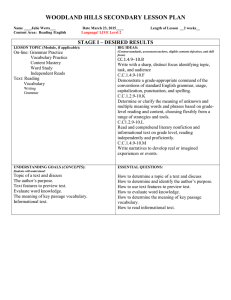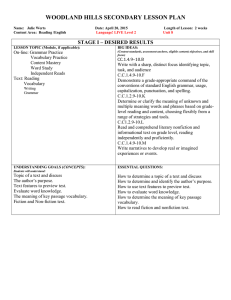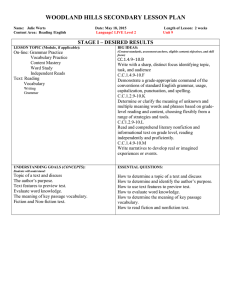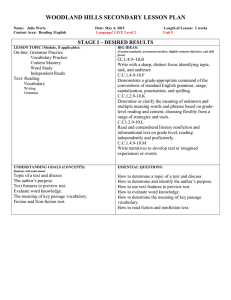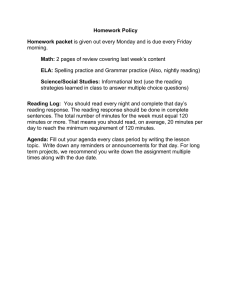WOODLAND HILLS SECONDARY LESSON PLAN
advertisement
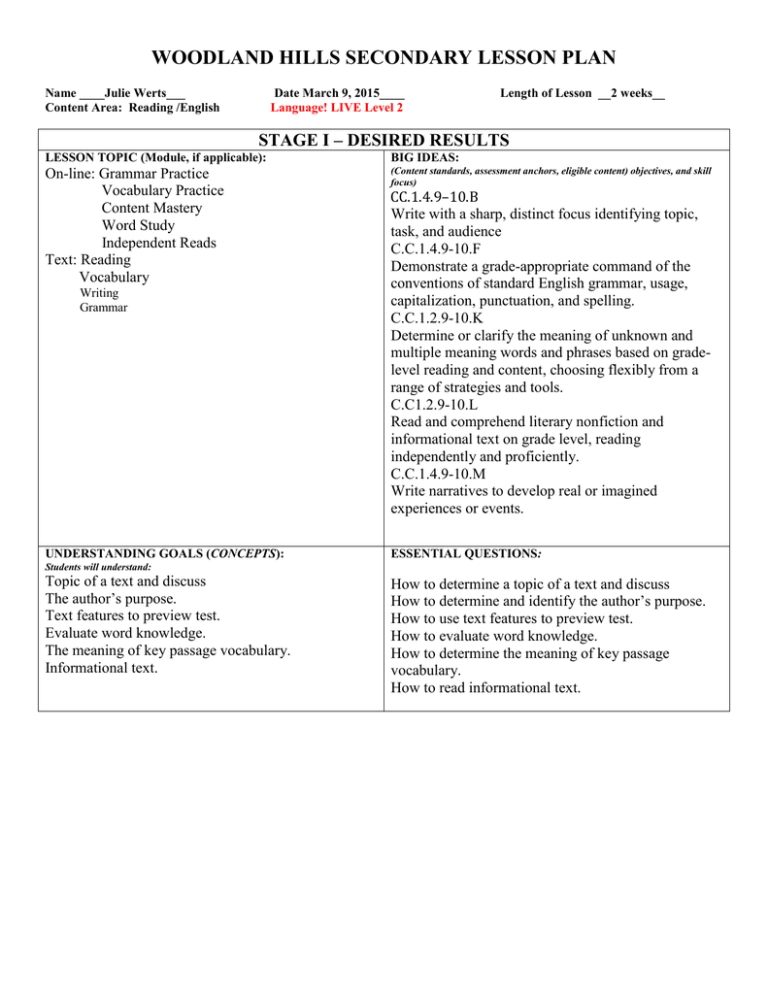
WOODLAND HILLS SECONDARY LESSON PLAN Name ____Julie Werts___ Content Area: Reading /English Date March 9, 2015____ Language! LIVE Level 2 Length of Lesson __2 weeks__ STAGE I – DESIRED RESULTS LESSON TOPIC (Module, if applicable): BIG IDEAS: On-line: Grammar Practice Vocabulary Practice Content Mastery Word Study Independent Reads Text: Reading Vocabulary (Content standards, assessment anchors, eligible content) objectives, and skill focus) Writing Grammar UNDERSTANDING GOALS (CONCEPTS): CC.1.4.9–10.B Write with a sharp, distinct focus identifying topic, task, and audience C.C.1.4.9-10.F Demonstrate a grade-appropriate command of the conventions of standard English grammar, usage, capitalization, punctuation, and spelling. C.C.1.2.9-10.K Determine or clarify the meaning of unknown and multiple meaning words and phrases based on gradelevel reading and content, choosing flexibly from a range of strategies and tools. C.C1.2.9-10.L Read and comprehend literary nonfiction and informational text on grade level, reading independently and proficiently. C.C.1.4.9-10.M Write narratives to develop real or imagined experiences or events. ESSENTIAL QUESTIONS: Students will understand: Topic of a text and discuss The author’s purpose. Text features to preview test. Evaluate word knowledge. The meaning of key passage vocabulary. Informational text. How to determine a topic of a text and discuss How to determine and identify the author’s purpose. How to use text features to preview test. How to evaluate word knowledge. How to determine the meaning of key passage vocabulary. How to read informational text. VOCABULARY: STUDENT OBJECTIVES (COMPETENCIES/OUTCOMES): Students will be able to: Restrain, encounter, pursue, vainly, compel, vengeance, ignorant, promotion, advantage, ascent Reading Determine a topic of a text and discuss Determine and identify the author’s purpose, plot and point of view. Use text features to preview test. Read informational text. Retell parts of a story. Use critical thinking skills to write responses to prompts. Support written answers with evidence from text Use context to determine meaning of words. Identify fact from opinion Identify main ideas and details Vocabulary Evaluate word knowledge. Determine the meaning of key passage vocabulary. Distinguish among connotations of words with similar denotations. Grammar Distinguish between a phrase and a clause Identify conjunctions and clauses in a sentence. Writing Use complex sentences structures Use conjunctions correctly in writing STAGE II – ASSESSMENT EVIDENCE PERFORMANCE TASK: FORMATIVE ASSESSMENTS: Students will complete on-line activities, workbook pages and supplemental materials. Daily attendance and participation will be assessed. Students are administered various probes throughout each unit to check for understanding, skill development and knowledge of skills presented Use thumbs up, thumbs Use of white boards Exit Slips Beginning of day Do Now On-line activities STAGE III: LEARNING PLAN INSTRUCTIONAL PROCEDURES: MATERIALS AND RESOURCES: Do Now; Mini Lesson: Guided Practice: Independent Practice: Summations/Formative Assessments: Reflections: Language! Live Level 2 work book Lap tops for on-line activities Supplemental pages Picture Cards Promethean Board Composition Book Highlighters Individual Wipe of Boards Word of Day Do Now: Collins Writing I Mini Lesson, Guided Practice, Independent Practice, and Summative/Formative assessment: Direct Instruction from INTERVENTIONS: ASSIGNMENTS: Specially Designed Instruction: One-on-one Instruction Small group instructions and discussions. Individualized attention Peer assistance Step-by-step directions and redirection New concepts Students will complete activities on-line. Students will also read text/story in the assigned workbook and complete workbook pages that correspond to the text/story and lessons. Each students will also complete supplemental activities corresponding to each lesson. Assignments will be completed independently, as a whole class and in the Language! Live Program. Students are presented a lesson a day consisting of six steps. The Program is scripted and scaffold to meet the needs of the student. Explicit instruction is used throughout each of the six steps. Adaptations are made to meet the individual needs of each student. Checking for understanding through exit ticket, oral discussions, etc. are reteaching of skills is used throughout each lesson. The first 45 minutes are spent on-line completing Vocabulary, Grammar, Fluency, Assessments. Text Lessons are teacher directed and are completed the second half of the 90 minute class. It covers Reading , Vocabulary, Writing, and Grammar The student will work through the 6 step process of each lesson. Students will complete text book readings, worksheets, on-line activities and supplemental pages for each step of each lesson in the unit. Each student will be responsible to complete a written assignment using skills learned in the lesson. Challenge and practice activities will be provided to individual students who need them. Six steps: Phonemic Awareness and Phonics broken down into clearer steps Practice and repeat drills for difficult concepts small groups. Interactive Text: 25-27, 28-29 Supplemental: Main Idea/Details Context Clues Fact/Opinion Vocabulary Directional Words Assessment: Fluency Check Spelling Word Recognition and Spelling Vocabulary and Morphology Grammar and Usage Listening and Reading Comprehension Writing
